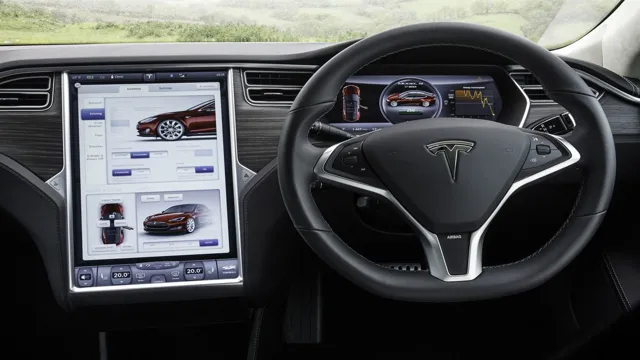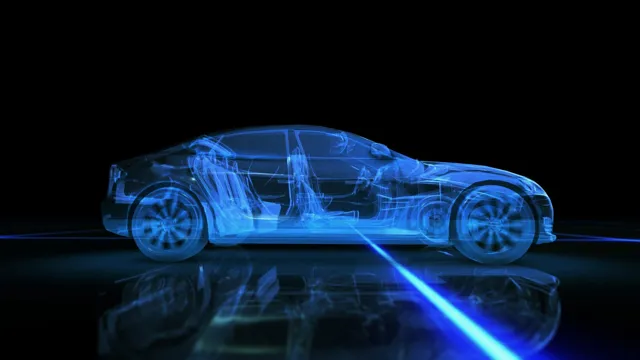Revolutionizing the Road: How Tesla Electric Car Technology is Changing the Game
If you’re a car enthusiast, you’ve undoubtedly heard of Tesla’s revolutionary electric cars. Tesla has made waves in the automotive industry by introducing advanced technology that is both environmentally friendly and highly efficient. Tesla’s electric cars have consistently received high praise for their innovative technology and impressive capabilities, and rightfully so.
In this blog, we will dive deeper into the innovations that Tesla’s electric car technology has brought to the table. From their advanced battery technology to their self-driving capabilities, we will explore the cutting-edge features that have made Tesla electric cars an impressive feat of engineering. So, fasten your seatbelt and join us on a journey to discover the future of transportation.
The Evolution of Battery Technology
Tesla is at the forefront of electric car technology, and one of the most important factors that contribute to the success of electric vehicles is the evolution of battery technology. Early electric cars had limited range and long charging times, making them impractical for most people, but advancements in battery technology have changed that. Tesla’s batteries are extremely efficient and have a longer lifespan compared to other car batteries.
One of the key factors in this technology is the use of lithium-ion batteries, which are smaller, lighter, and more efficient than their predecessors. Lithium-ion batteries have enabled many of the advancements in electric cars that we see today, and Tesla has managed to take advantage of them better than most. With this technology, Tesla has created cars that can travel long distances on a single charge, making them practical for everyday use.
As technology continues to evolve, we can expect even more advancements in battery technology, and Tesla will likely continue to be at the forefront of this evolution.
The Role of Lithium-ion Batteries
Lithium-ion batteries have revolutionized the way we power our modern devices. Unlike traditional batteries, they can hold more charge and have a longer lifespan. However, their evolution did not happen overnight.
It took years of research and development to create a reliable and efficient battery that could power everything from our smartphones to electric cars. As technology advanced, so did the demand for more powerful and durable batteries. Today, lithium-ion batteries are the backbone of the electric vehicle industry and a critical component of renewable energy storage systems.
With advancements in battery technology, we can only expect further improvements in efficiency, cost, and performance, making lithium-ion batteries a vital part of our sustainable future.

Tesla’s Battery Management System
Tesla has revolutionized the automotive industry with its electric vehicles, which offer unmatched performance, efficiency, and sustainability. One of the key components of Tesla’s cars is their battery management system, which ensures optimal performance, safety, and longevity of the battery. Over the years, Tesla has continuously improved its battery technology, incorporating cutting-edge innovations such as silicon anodes, cobalt-free cathodes, and smart software algorithms that optimize charging and discharging cycles.
Tesla’s battery management system also includes advanced thermal management, which regulates the temperature of the battery to prevent overheating and enhance efficiency. With these advancements, Tesla has made electric cars more accessible and practical than ever before, paving the way for a future of sustainable transportation.
The Performance of Electric Cars
Tesla is at the forefront of electric car technology and has been able to push the boundaries when it comes to the performance of their vehicles. The electric motor used in the Tesla enables the car to accelerate quickly and smoothly, with no need for gear changes. This not only makes it more efficient, but also provides a more enjoyable driving experience.
The battery technology has also improved significantly over the years, with Tesla’s latest Model S having a range of up to 402 miles on a single charge. This is a significant improvement when compared to the first Tesla cars, which had a range of around 200 miles. Moreover, Tesla has invested heavily in its charging infrastructure, making it easier and more convenient for drivers to charge their vehicles on the go.
With the development of better technology and infrastructure supporting electric cars, it is clear that the future of driving is electric, and Tesla is leading the way.
Instant Torque
Electric cars are known for their instant torque and impressive performance. Unlike traditional gasoline-powered cars, which rely on a mechanical transmission to engage their engines and reach their maximum acceleration, electric cars can achieve their peak power immediately. Thanks to their electric motors, electric cars deliver torque to their wheels instantly, leading to quick and exhilarating takeoffs.
This instant torque not only provides drivers with a thrilling ride, but it also makes electric cars more efficient and responsive on the road. Plus, without the delay that comes with shifting gears, electric cars can maintain a smooth and uninterrupted ride, making them a comfortable option for both drivers and passengers. It’s no wonder that electric cars have gained a reputation as being fast, fun, and environmentally friendly machines that are changing the way we think about transportation.
Acceleration Capabilities
Acceleration Capabilities When it comes to electric cars, a common misconception is that they lack power and acceleration. However, this couldn’t be further from the truth. Electric cars are able to accelerate quickly due to their instant torque, which means the power is delivered to the wheels immediately.
This instant power delivery allows electric cars to achieve impressive acceleration speeds, even beating out some gas-powered sports cars. For example, the Tesla Model S can go from 0 to 60 mph in just 5 seconds, making it one of the quickest cars on the road.
Electric cars not only offer quick acceleration, but they also provide a smooth and quiet ride, making for a truly unique driving experience. With advancements in technology, the performance of electric cars is only set to improve, making them an enticing option for those looking for both speed and sustainability. So, if you’re looking for a car that combines power and eco-friendliness, an electric car could be the way to go.
Regenerative Braking System
Electric cars have revolutionized transportation by introducing innovative technology that offers several advantages over traditional gasoline-powered engines. One crucial aspect that permits electric vehicles to exhibit superior performance is the regenerative braking system. Unlike conventional brakes, regenerative brakes capture energy when a car is slowing down, converting it into usable electricity to recharge the car’s battery.
This process reduces the wear and tear on brake pads and increases the vehicle’s battery life. Additionally, regenerative braking systems deliver smoother stops, which positively impacts the car’s handling and overall driving experience. This technology ensures electric cars are highly efficient and eco-friendly while maintaining excellent driving performance.
Therefore, the regenerative braking system is a critical component for the success of electric vehicles on the market.
The Advancements in Autopilot Technology
Tesla electric car technology has advanced significantly over the years, particularly in terms of its autopilot technology. The latest version of the autopilot system uses a combination of cameras, radar, and ultrasonic sensors to detect and respond to its surroundings, allowing for a level of autonomous driving that was once thought impossible. This technology enables the car to steer, accelerate, and brake on its own, even on winding roads or in heavy traffic.
Furthermore, new AI algorithms are constantly being developed to improve the system’s ability to detect objects, predict traffic conditions, and make decisions on the fly, all while providing a seamless and comfortable driving experience for the passengers. With such advances in Tesla’s autopilot technology, it’s no wonder that many people are investing in this eco-friendly mode of transportation.
Autopilot Features
Autopilot Features Autopilot technology has come a long way in recent years, with advancements that have made it safer and more efficient than ever before. One of the most significant breakthroughs in autopilot technology is the use of artificial intelligence and machine learning algorithms that can improve decision making in real-time. These features allow for better control and more precise movements, reducing the risk of accidents and improving overall vehicular performance.
Additionally, the integration of sensors and cameras enables the autopilot to detect and respond to various environmental factors, such as weather, traffic, and road conditions. These technological developments have led to increased autonomy and control over vehicles, making driving a much more relaxed and seamless experience for both drivers and passengers. The future of autopilot technology looks incredibly bright, with many more exciting advancements in the pipeline that will revolutionize the way we drive.
Self-Driving Capabilities
As technology continues to advance, self-driving capabilities have become more prevalent in vehicles. One of the most significant advancements has been in autopilot technology, which has made cars safer and more efficient on the roads. Autopilot technology allows cars to drive themselves to a certain extent, with features such as lane departure warnings, adaptive cruise control, and automatic braking systems.
These systems work together to keep the car in the correct lane, maintain a safe distance from other cars, and slow down or stop the car if necessary. This technology has brought us one step closer to fully autonomous vehicles, but it is important to remember that while autopilot technology is impressive, it still requires human supervision and intervention when necessary. As we continue to develop and improve self-driving capabilities, we must also consider the potential risks and benefits and work towards creating a safer and more efficient transportation system for all.
The Impact of Tesla’s Technology on the Automotive Industry
Tesla’s electric car technology has revolutionized the automotive industry in a multitude of ways, disrupting the traditional gas-powered status quo and offering a more sustainable future. Tesla’s electric cars are not only environmentally friendly but also offer a smooth and quiet ride with instant acceleration. The technology behind these cars has sparked an increase in the demand for electric cars and has resulted in other automotive companies following suit and developing their versions.
Tesla’s innovation has also propelled the development of batteries to make electric cars more efficient and reduce the cost of production. As a result of Tesla’s electric car technology, the world has been introduced to a new era of sustainable transportation that is rapidly gaining popularity. The future is indeed electric, and it is all thanks to Tesla’s game-changing technology.
Conclusion
In conclusion, the Tesla electric car technology is paving the way towards a brighter and more sustainable future by producing vehicles that not only look sleek and stylish but also leave a much smaller carbon footprint. With its innovative advancements, Tesla has shown that electric cars can be just as powerful and practical as traditional gas-powered vehicles. And who knows, maybe someday we’ll be charging our vehicles with electricity generated from the very same lightning bolts that inspired Tesla’s namesake.
“
FAQs
What is the technology behind Tesla electric cars?
Tesla electric cars utilize advanced lithium-ion battery technology, electric motor technology, and software systems for performance and energy efficiency.
How efficient are Tesla electric cars compared to traditional gas-powered cars?
Tesla electric cars are significantly more energy-efficient than traditional gas-powered cars. In fact, Tesla vehicles typically have a range of over 300 miles on a single charge.
Can you charge a Tesla at home?
Yes, you can charge your Tesla at home with a 240-volt home charging station. This allows for faster charging times and can fully charge your vehicle overnight.
Is Tesla the only manufacturer of electric cars?
No, Tesla is one of the most well-known electric car manufacturers, but there are also other manufacturers like Nissan, BMW, and Chevrolet that produce electric cars.





